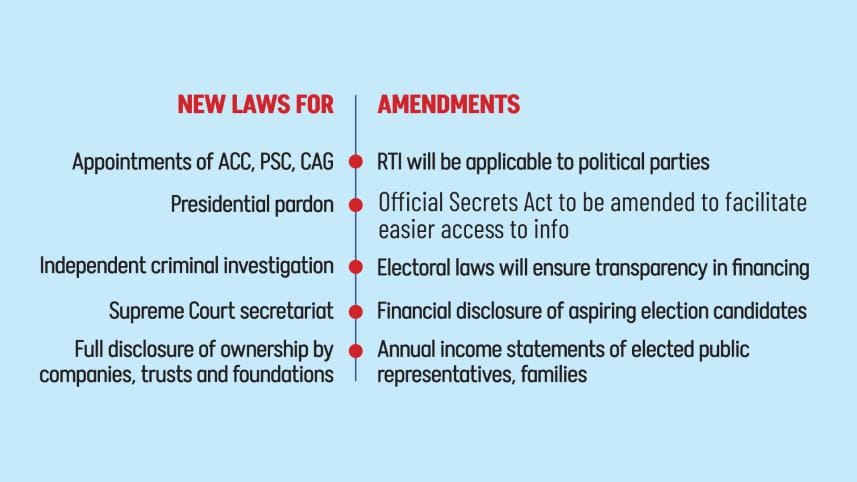A dozen new laws for system reboot

"These laws are primarily related to state institutions, which are meant to serve the public interest, not the interests of those in power."
It will require at least a dozen new laws and amendments to eight existing ones to implement the raft of proposals made in the July National Charter.
These laws are needed to strengthen oversight, promote good governance and accountability, and address the long-standing legal gaps that have fostered impunity, politicisation, and corruption, said members of the consensus commission that facilitated dialogue between political parties.
The parties agreed to enact laws for presidential pardon; appointments of the comptroller and auditor general (CAG), and the chairman and members of the Public Service Commission; a code of conduct for election commissioners; administrative autonomy for the judiciary; and independent criminal investigation, among others.
They also reached a consensus that reforms which don't require constitutional changes can be implemented through ordinances and executive orders.
Consensus commission Vice President Ali Riaz said the overarching objective is to establish an accountable state and strengthen its institutions so that the country is not governed by the whims of any individual or group.

NEW LAWS
The charter states that the president will be authorised to pardon or reduce any sentence, but the procedure must adhere to the principles prescribed by a new law, which will require the consent of the complainant or the victim's family.
Iftekharuzzaman, a member of the consensus commission, said the charter has proposed enacting laws to regulate the appointments of the CAG and the chairman and members of the PSC. It also calls for amendments to existing laws governing the appointment process of election commissioners, the Ombudsman, and the Anti-Corruption Commission.
According to the charter, there should be a new law and a code of conduct to ensure the accountability of election commissioners, and another to regulate special rights of parliamentary committees and its members.
The charter calls for enactment of a Supreme Court secretariat law, leading to an autonomous administrative body for the SC with financial independence. The secretariat will be responsible for administrative functions of subordinate courts, their budgets as well as promotions, transfer, and disciplinary regulation of subordinate court judges.
It also proposes Independent Criminal Investigation Service Act to create an impartial body for investigating criminal offences, free from political or bureaucratic influence.
There needs to be a law to prevent corruption and money laundering through concealment of actual ownership of institutions. This law will create a framework to keep records and publicly disclose all details of owners of companies, trusts, and foundations.
Another new law would end state practices that legitimise income without a lawful source, while Audit Act would ensure independent auditing.
The charter also proposes a beneficial ownership law to prevent conflicts of interest and the misuse of state and legal authority to amass undisclosed or hidden assets.
Iftekharuzzaman, also the head of Transparency International Bangladesh, said the new laws would ensure good governance and secure government accountability.
"These laws are primarily related to state institutions, which are meant to serve the public interest, not the interests of those in power."
AMENDMENT TO EXISTING LAWS
The Right to Information Act, 2009, would be reviewed and amended to ensure citizens have easier and uninterrupted access to government service information. Additionally, registered political parties would be brought under the purview of this law, according to the charter.
The Official Secrets Act, 1923, would be reviewed and amended to facilitate timely and easier access to information for citizens.
Electoral laws would be reformed to strengthen transparency and integrity in political and election financing. Political parties and election candidates must publicly disclose details about their sources of funding, income and expenditure.
The EC, with support from the National Board of Revenue and the ACC, would verify the accuracy of candidates' financial disclosures in their affidavits and take appropriate action in case of discrepancies.
All elected public representatives would be required to submit annual statements of income and assets for themselves and their family members to the EC within three months of taking office. These statements would be published on the commission's website.
Political parties would be barred from appointing or nominating individuals involved in corruption or misconduct to party positions or as election candidates.
A provision of the Anti-Corruption Commission Act, 2004, would be repealed, exempting the corruption watchdog from the requirement of prior government approval for filing cases against judges, magistrates, or government officials.
Another provision of the law would also be amended to reduce the tenure of commissioners from five years to four.
The Legal Aid Services Act, 2000, would be repealed, and a new ordinance, "Legal Aid and Mediation Services Ordinance, 2025", would be promulgated.




 For all latest news, follow The Daily Star's Google News channel.
For all latest news, follow The Daily Star's Google News channel.
Comments